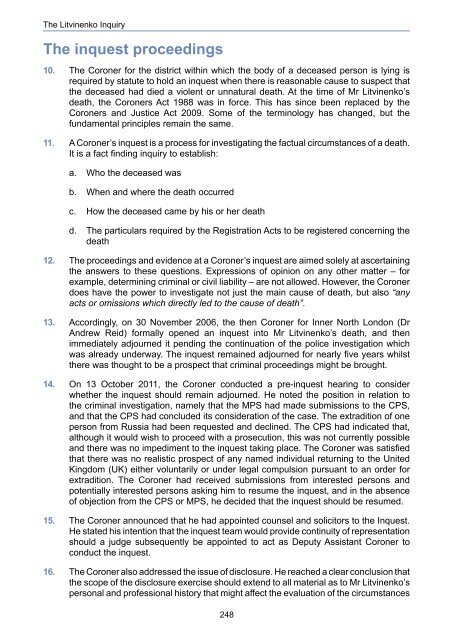The Litvinenko Inquiry
JIEp7Zyr
JIEp7Zyr
Create successful ePaper yourself
Turn your PDF publications into a flip-book with our unique Google optimized e-Paper software.
<strong>The</strong> <strong>Litvinenko</strong> <strong>Inquiry</strong><br />
<strong>The</strong> inquest proceedings<br />
10. <strong>The</strong> Coroner for the district within which the body of a deceased person is lying is<br />
required by statute to hold an inquest when there is reasonable cause to suspect that<br />
the deceased had died a violent or unnatural death. At the time of Mr <strong>Litvinenko</strong>’s<br />
death, the Coroners Act 1988 was in force. This has since been replaced by the<br />
Coroners and Justice Act 2009. Some of the terminology has changed, but the<br />
fundamental principles remain the same.<br />
11. A Coroner’s inquest is a process for investigating the factual circumstances of a death.<br />
It is a fact finding inquiry to establish:<br />
a. Who the deceased was<br />
b. When and where the death occurred<br />
c. How the deceased came by his or her death<br />
d. <strong>The</strong> particulars required by the Registration Acts to be registered concerning the<br />
death<br />
12. <strong>The</strong> proceedings and evidence at a Coroner’s inquest are aimed solely at ascertaining<br />
the answers to these questions. Expressions of opinion on any other matter – for<br />
example, determining criminal or civil liability – are not allowed. However, the Coroner<br />
does have the power to investigate not just the main cause of death, but also “any<br />
acts or omissions which directly led to the cause of death”.<br />
13. Accordingly, on 30 November 2006, the then Coroner for Inner North London (Dr<br />
Andrew Reid) formally opened an inquest into Mr <strong>Litvinenko</strong>’s death, and then<br />
immediately adjourned it pending the continuation of the police investigation which<br />
was already underway. <strong>The</strong> inquest remained adjourned for nearly five years whilst<br />
there was thought to be a prospect that criminal proceedings might be brought.<br />
14. On 13 October 2011, the Coroner conducted a pre-inquest hearing to consider<br />
whether the inquest should remain adjourned. He noted the position in relation to<br />
the criminal investigation, namely that the MPS had made submissions to the CPS,<br />
and that the CPS had concluded its consideration of the case. <strong>The</strong> extradition of one<br />
person from Russia had been requested and declined. <strong>The</strong> CPS had indicated that,<br />
although it would wish to proceed with a prosecution, this was not currently possible<br />
and there was no impediment to the inquest taking place. <strong>The</strong> Coroner was satisfied<br />
that there was no realistic prospect of any named individual returning to the United<br />
Kingdom (UK) either voluntarily or under legal compulsion pursuant to an order for<br />
extradition. <strong>The</strong> Coroner had received submissions from interested persons and<br />
potentially interested persons asking him to resume the inquest, and in the absence<br />
of objection from the CPS or MPS, he decided that the inquest should be resumed.<br />
15. <strong>The</strong> Coroner announced that he had appointed counsel and solicitors to the Inquest.<br />
He stated his intention that the inquest team would provide continuity of representation<br />
should a judge subsequently be appointed to act as Deputy Assistant Coroner to<br />
conduct the inquest.<br />
16. <strong>The</strong> Coroner also addressed the issue of disclosure. He reached a clear conclusion that<br />
the scope of the disclosure exercise should extend to all material as to Mr <strong>Litvinenko</strong>’s<br />
personal and professional history that might affect the evaluation of the circumstances<br />
248


